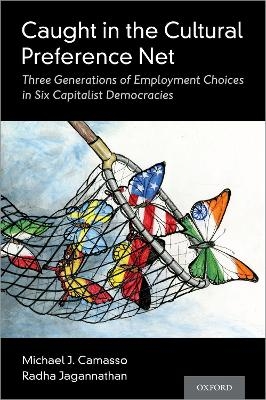
Caught in the Cultural Preference Net
Oxford University Press Inc (Verlag)
978-0-19-067278-2 (ISBN)
Caught in the Cultural Preference Net examines work-related beliefs, attitudes and preferences that characterize the value orientations of three generational families in Germany, Sweden, Spain, Italy, India and the United States. These six countries have developed significantly different forms of capitalism ranging from the social democratic form in Sweden to the relatively unfettered, free market capitalism in the United States. Michael J. Camasso and Radha Jagannathan investigate whether these cultural and economic contexts have resulted in enduring attitude and preference structures or if these values and preferences have been changing as economic conditions in a nation have changed. These two experts focus a great deal of their attention on the roles that parents and grandparents have in socializing Millennials into the world of work and if this influence trumps the often competing influences of education, labor market and peers.
The book is organized around three lines of inquiry: (1) Do some national cultures possess value orientations that are more successful than others in promoting economic opportunity? (2) Does the transmission of these value orientations demonstrate a persistence irrespective of economic conditions or are they simply the results of these conditions? (3) If a nation's value orientation does indeed impact economic opportunity, does it do so by influencing an individual's preferences? To answer this third question, Camasso and Jagannathan conduct a cross-national, multi-generational stated preference experiment--one of the very few ever attempted.
The resulting book reveals substantial cultural stability across generations in some of the six capitalist democracies and substantial intergenerational change in others. The implications of this differential impact for national employment strategies are explored as are the implications for a global economy distinguished by abundant, well-paying service jobs for youth.
Michael J. Camasso, PhD, is Professor of Resource Economics in the School of Environmental and Biological Sciences at Rutgers University. Radha Jagannathan, PhD, is Professor of Statistics in the Edward J. Bloutein School of Planning and Public Policy at Rutgers University.
Preface
Acknowledgments
Chapter 1: Cultural Orientations and Economic Outcomes
Chapter 2: The Prominence of Culture in Economic Conditions
Chapter 3: Human Capital and Labor Supply
Chapter 4: Skill Shortages, Skill Gaps and Labor Demand
Chapter 5: Investigating the Cultural Transmission of Economic Values: Survey and Sampling Methods
Chapter 6: Attitudes, Beliefs, Intentions and Metaphors Over Time and In Place: Description and Analysis
Chapter 7: National and Intergenerational Similarities and Differences: Stated Preferences
Chapter 8: Cultural Preference Nets: The Good, the Not So Good and the Just Plain Dysfunctional
Appendix A: Work Values and Opinions: Interview Schedule
Appendix B: Regression Results
References
Index
| Erscheinungsdatum | 24.02.2021 |
|---|---|
| Verlagsort | New York |
| Sprache | englisch |
| Maße | 236 x 157 mm |
| Gewicht | 522 g |
| Themenwelt | Sozialwissenschaften ► Pädagogik ► Sozialpädagogik |
| Sozialwissenschaften ► Politik / Verwaltung ► Staat / Verwaltung | |
| Sozialwissenschaften ► Soziologie | |
| Wirtschaft ► Volkswirtschaftslehre | |
| ISBN-10 | 0-19-067278-1 / 0190672781 |
| ISBN-13 | 978-0-19-067278-2 / 9780190672782 |
| Zustand | Neuware |
| Informationen gemäß Produktsicherheitsverordnung (GPSR) | |
| Haben Sie eine Frage zum Produkt? |
aus dem Bereich


